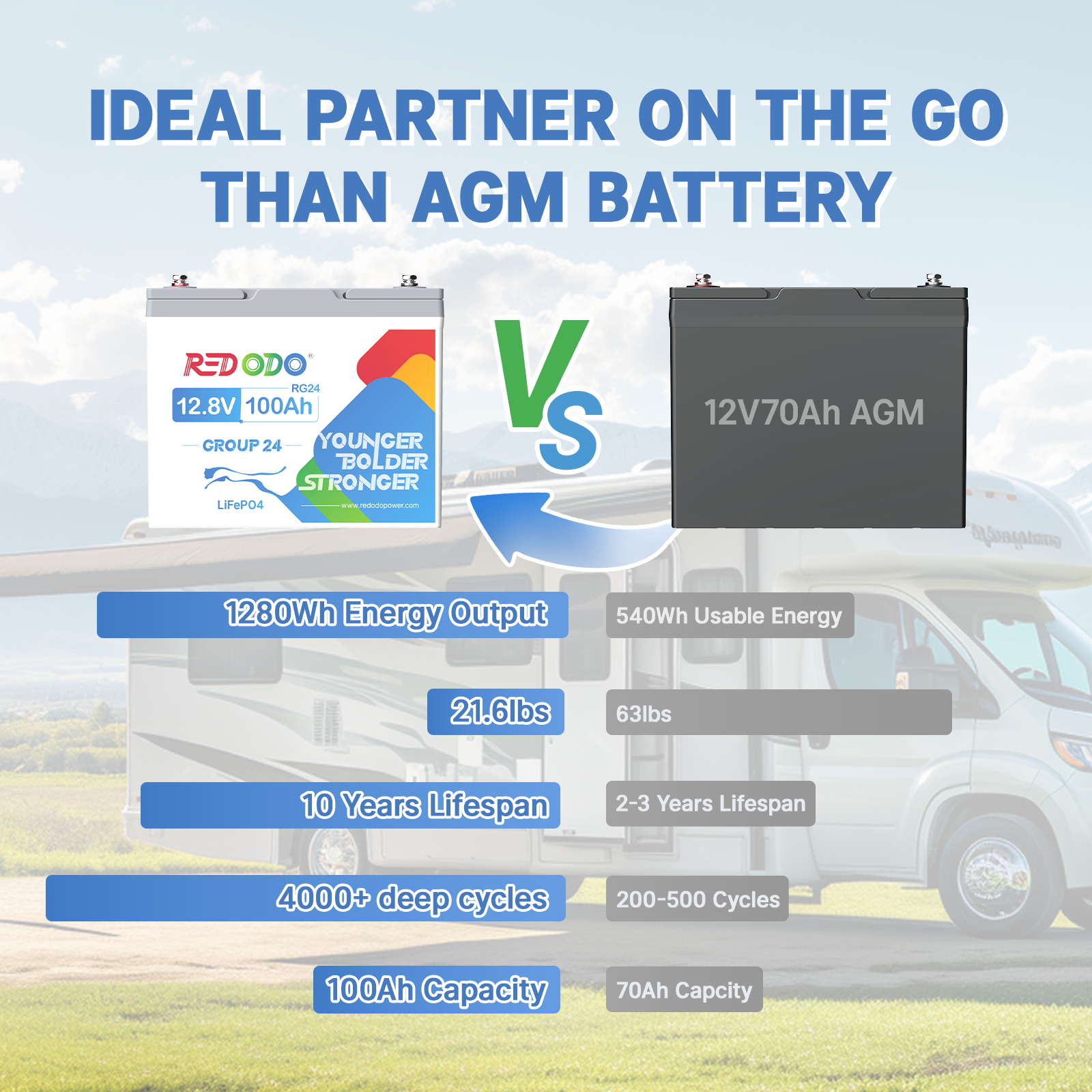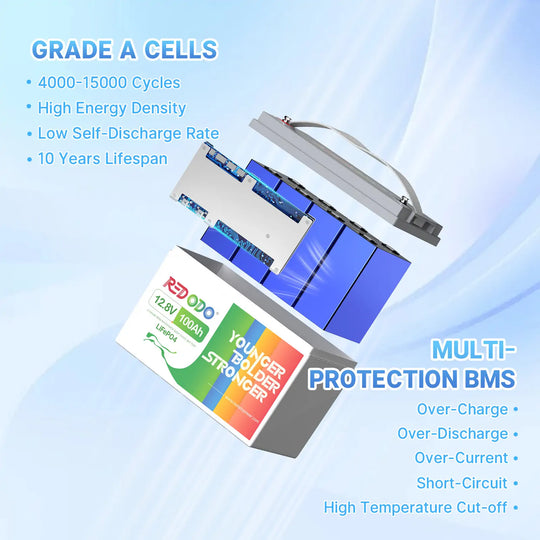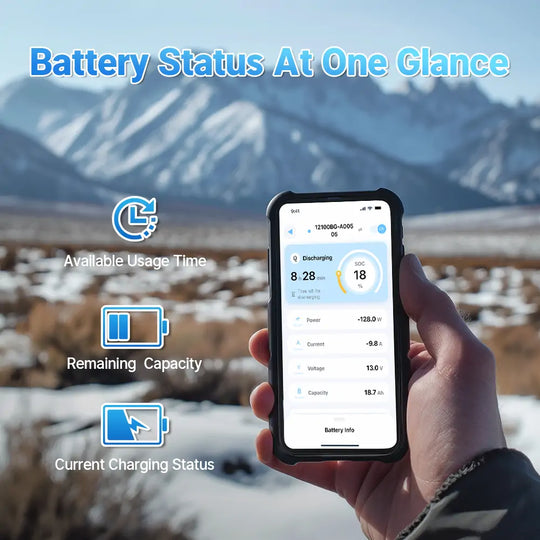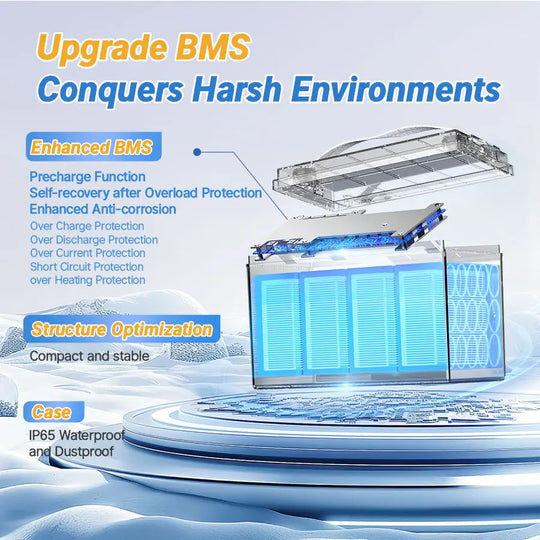In today’s landscape, where portable power is crucial for various applications, choosing the right battery technology is vital for ensuring optimal performance, longevity, and cost-efficiency. Two widely compared options are AGM (Absorbent Glass Mat) batteries and lithium batteries.
Each of these battery types has distinct characteristics and uses, making it important to understand their differences to make an informed choice.
What is AGM Battery
AGM, or Absorbent Glass Mat, refers to a type of advanced lead-acid battery. Unlike traditional lead-acid batteries, AGM batteries contain the electrolyte (sulfuric acid) absorbed into a fiberglass mat, making them spill-proof and maintenance-free.
AGM batteries are widely used in scenarios requiring reliable, maintenance-free power storage, such as backup power systems, renewable energy storage, marine and RV applications, and certain automotive uses. Known for their capacity to deliver high currents on demand, AGM batteries are ideal in situations where a dependable power source is essential.
What is Lithium Battery
A lithium battery is a rechargeable power source that uses lithium as an active material, making it highly favored across a wide range of applications. Known for their high energy density, low self-discharge, and long lifespan, lithium batteries can be recharged hundreds to thousands of times. They come in various chemistries, including lithium-ion (Li-ion), lithium polymer (LiPo), and lithium iron phosphate (LiFePO4), among others.
Lithium-ion batteries are prevalent in consumer electronics such as smartphones, laptops, and tablets, as well as in electric vehicles, power tools, and energy storage systems. Their lightweight design and high energy density make them ideal for portable electronic devices and electric vehicles.
Lithium batteries are prized for their ability to deliver substantial power and energy density, making them a preferred choice in many modern applications. However, it’s crucial to handle and charge lithium batteries properly to ensure safety and maximize their lifespan.
The Comprehensive Comparison of AGM VS Lithium Battery
To understand the performance differences between AGM and lithium batteries, we will evaluate them based on key parameters. This comparison will reveal which battery excels in each category, helping you make an informed decision tailored to your needs.
Depth of Discharge (DoD):
- AGM: Generally offers a depth of discharge around 50%. Discharging beyond this limit can damage the battery.
- Lithium: Allows for a much deeper discharge, exceeding 80% and even up to 100% without causing harm. As a result, a lithium battery of the same capacity provides up to twice the usable energy compared to an AGM battery.
Lifespan:
- AGM: Typically, AGM batteries have a lifespan of about 300-500 cycles, translating to a service life of approximately 3 to 5 years.
- Lithium: Lithium batteries generally boast a much longer lifespan, with life cycles ranging from 4,000 to 15,000. For instance, Redodo lithium batteries can last between 10 to 15 years.
Size and Weight:
- AGM: AGM batteries tend to be quite heavy, with a 12V 100Ah model typically weighing between 63 and 70 lbs.
- Lithium: Lithium batteries are much lighter and more compact. For instance, a Redodo 12V 100Ah Group 24 Lithium battery weighs only 21 lbs.

Energy Density:
- AGM: A Group 24 AGM battery typically has an energy density of about 7.23 Wh/lb.
- Lithium: In contrast, a Group 24 lithium battery provides a significantly higher energy density of approximately 60.95 Wh/lb.
Charge Time and Efficiency:
- AGM: AGM batteries typically have longer charge times and lower charge efficiency than lithium batteries. It generally takes about 8 hours to fully charge an AGM battery.
- Lithium: Lithium batteries charge faster and with higher efficiency compared to AGM batteries. Most lithium batteries support 0.2C charging; for example, a 12V 100Ah lithium battery, with a recommended charging current of 20A, can be fully charged in 5-6 hours.
Maintenance:
- AGM: AGM batteries generally require minimal maintenance but may benefit from occasional equalization charging. It's advisable to keep them at full charge when not in use.
- Lithium: Lithium batteries require minimal maintenance and do not necessitate regular equalization charging.
Environment Friendly:
Both AGM and lithium batteries are recyclable and provide environmentally friendly options. However, lithium batteries hold a slight edge due to their higher energy density and longer lifespan, resulting in fewer batteries needing recycling over time.
Safety:
- AGM: AGM batteries are generally safe but can release hydrogen gas if overcharged or improperly maintained.
- Lithium: Lithium-ion batteries do not produce gas accumulation and contain no toxic liquids, making them safe for use without additional safety precautions. Additionally, lithium batteries are equipped with a Battery Management System (BMS) for added protection.

Bluetooth Technology
Lithium batteries offer a significant technological advantage over AGM batteries. For example, Redodo 12V 100Ah Smart Bluetooth Lithium Battery incorporates Bluetooth technology. This feature allows you to monitor your battery's status conveniently at any time, ensuring smooth operation before setting out on boating trips, RV adventures, or UTV excursions.

With Bluetooth connectivity, you can easily check crucial details such as remaining charge, voltage levels, and temperature, providing you with direct access to essential information. Using the Redodo App on your smartphone, Bluetooth enables effortless access to all your battery's data with just a few taps, eliminating guesswork and uncertainty and giving you peace of mind in managing your power needs.
Initial Cost
Cost is a crucial factor when deciding between two battery types, with two key factors to consider: initial cost and cost per kWh.
Lithium-ion batteries require a higher initial investment. Despite their superior performance in other aspects compared to AGM batteries, the upfront cost is considerably higher.
AGM batteries present themselves as the more economical choice in terms of initial investment. However, when evaluating lifetime costs, lithium-ion batteries demonstrate their superiority due to their significantly longer lifespan.
|
Aspect |
AGM Battery |
Lithium Battery |
|
Depth of Discharge |
Typically around 50% |
Over 80%, up to 100% without damage |
|
Lifespan |
300-500 cycles, 3-5 years |
4000-15000 cycles, 10-15 years |
|
Size and Weight |
Heavier, 12V 100Ah: 63-70lbs |
Lighter, 12V 100Ah: 21lbs |
|
Energy Density |
7.23Wh/lbs |
6X than similar Lead Acid batteries |
|
Charge Time |
Longer charge times |
Shorter charge times |
|
Charge Efficiency |
Lower charge efficiency |
Higher charge efficiency |
|
Maintenance |
Minimal maintenance, occasional equalization charging |
Minimal maintenance, no regular equalization charging |
|
Environmental Impact |
Recyclable, less environmentally friendly due to energy density and shorter lifespan |
Recyclable, more environmentally friendly due to energy density and longer lifespan |
|
Safety |
Generally safe, potential hydrogen gas release if overcharged |
Safer, no gas release, equipped with BMS for protection |
|
Bluetooth |
No |
Yes |
|
Initial Cost |
Lower |
Higher |
Comparison of AGM and Lithium Battery Applications
After evaluating the performance of AGM and lithium batteries across different parameters, it's essential to consider their suitability for specific applications.
Batteries are not universally applicable, and some models may excel in particular scenarios. Let's delve into the specific applications where AGM and lithium batteries are ideal:
Leisure Batteries
When selecting leisure batteries for motorhomes or caravans, LFP batteries stand out as an ideal choice. In the RV battery market, consumers prioritize deep cycle life, safety, and minimal maintenance. Lithium leisure batteries, especially those using lithium iron phosphate technology, excel in meeting these requirements. When integrating lithium batteries into a motorhome, dedicated battery chargers are recommended over built-in chargers for optimal performance.
Marine Batteries
Traditional liquid or gel batteries are not ideal for marine applications due to their susceptibility to movement, which can affect their performance. In contrast, most lithium batteries are solid-state and do not contain liquids, making them highly suitable for marine use. Moreover, advanced marine lithium batteries such as the Redodo Trolling Motor Battery features upgraded Battery Management Systems (BMS) designed specifically for marine environments. These systems enhance reliability by providing resistance to moisture, dust, water, and salt spray, ensuring durability in humid and challenging conditions.

Freezing Conditions
Using batteries in freezing conditions presents challenges, particularly with charging, which can be difficult at low temperatures. AGM batteries excel over lithium batteries in this regard.
However, advanced lithium batteries like Redodo Lithium’s LFP batteries incorporate a self-heating feature. This capability allows them to perform similarly to AGM batteries even in sub-zero conditions.
Solar Energy Storage
Lithium iron phosphate batteries are ideal for solar energy storage due to their high energy density, depth of discharge capabilities, and extended warranty. While the initial cost of a single AGM battery may be lower, over the lifetime, a single lithium battery can match the performance of 16 AGM batteries. Therefore, for solar storage applications, LFP batteries stand out as the superior choice.
UPS Battery
Just like in the RV battery market, the UPS (Uninterruptible Power Supply) market favors LFP (lithium iron phosphate) batteries. They offer enhanced safety, require minimal maintenance, and provide greater capacity compared to equivalent AGM batteries, making them a more convenient long-term ownership choice.
The Ultimate Decision
When comparing lithium and AGM batteries, each has its advantages and drawbacks. However, when prioritizing a reliable, efficient, and lightweight maintenance-free solution, the choice becomes clear. Lithium batteries emerge as the superior option for your application. Their enhanced performance, extended lifespan, and integrated Bluetooth technology provide considerable ease and convenience. Moreover, they can ultimately save you valuable time and money.

Redodo

Redodo
Recent Post

Convert RV from Lead-Acid to Lithium Battery: A Complete Guide

How Long Will a 200Ah Battery Run an Air Conditioner?

A Full Review of Redodo 12V 140Ah Group 31 Deep Cycle Battery

How Much Does it Cost to Replace Golf Cart Batteries?


![⚡[$220 after Sign-Up] Redodo 12V 100Ah LiFePO4 Lithium Battery | Best Budget | For RV, Solar, Trolling Motor](http://www.redodopower.com/cdn/shop/files/Redodo_12v_100ah_lithium_battery_b9015ddd-64b5-4be2-8c88-392f0bb4ab30.jpg?v=1742973160)
![⚡[$220 after Sign-Up] Redodo 12V 100Ah Group 24 Deep Cycle LiFePO4 Lithium Battery | For Home, RV, Marine](http://www.redodopower.com/cdn/shop/files/Redodo_12V_100Ah_group_24_lithium_battery_6301965d-f6e8-467f-825f-3eec839b3e1f.jpg?v=1744105344)
![⚡[$220 after Sign-Up] Redodo 12V 100Ah Lithium Trolling Motor Battery With Low Temp Protection](http://www.redodopower.com/cdn/shop/files/Redodo12V100Ahlow-tempbattery.webp?v=1738462317)
![⚡[$248 after Sign-Up] Redodo 12V 100Ah Bluetooth Marine Battery | For Marine, Trolling Motors, RV](http://www.redodopower.com/cdn/shop/files/Redodo12V100AhOBMOutboardMotorLithiumMarineBattery.webp?v=1743584091)
![⚡[$294 after Sign-Up] Redodo 12V 140Ah Group 31 Lithium Battery with Bluetooth | 40% More Capacity | For RV, Marine, Solar Home](http://www.redodopower.com/cdn/shop/files/Redodo_12V_140ah_bluetooth_battery_ee6d5fd1-5c7d-4b9a-90ab-d54d06b29a04.jpg?v=1742967763)
![⚡[$377 after Sign-Up] Redodo 12V 200Ah Lithium LiFePO4 Battery | 1280W Load Power | For RV, Solar, Off-Grid](http://www.redodopower.com/cdn/shop/files/Redodo12V200ahlithiumbattery.jpg?v=1735892910)

![⚡[$450 after Sign-Up] Redodo 12V 280Ah LiFePO4 Battery | Low Temp Protection | For RV, Marine, Solar](http://www.redodopower.com/cdn/shop/files/Redodo12V280AhLowTempCutoffLiFePO4Battery.jpg?v=1741251504)